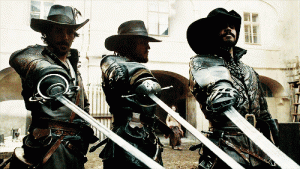Reading The Three Musketeers, by Dumas

So, encouraged by my good friend and author Thomas Jensen, I’m reading The Three Musketeers. I won’t recap much of the storyline, but: D’Artagnan, the earnest young hero from the Gascon countryside, comes to Paris, meets Athos, Porthos, and Aramis, and has adventures.
In fact, we’re reading it together, using the new Social Reading capabilities of The Hawaii Project. It was an interesting and rewarding experience reading it together. More on that later.
I’d previously read The Count of Monte Cristo, and while I was expecting a romp, I was still surprised at the cavalier (pun intended!) tone of The Three Musketeers. It’s been many years since I read the former work but I recall it as very serious, while still adventurous. The Three Musketeers often verges on the slapstick, even when people are dying and very serious events are transpiring. It has any number of laugh out loud moments, even as people are run through with swords.
People read for many reasons; for entertainment, for escape, for learning, for inspiration. The Three Musketeers will deliver on all of those. I read for all those reasons but I always try to take one thing from every book I read, to incorporate into my life and worldview. If I take anything from The Three Musketeers, it is to keep the joy of adventure and the appreciation for the unexpected.
I found a few things surprising in the book. While our heroes are definitely heroic, they also have feet of clay in many respects. Most surprising to modern ears may be the cavalier (that word again!) way in which they have adulterous affairs, sometimes more than one simultaneously, and this is presented as a desirable state of affairs — the primary object seeming to be, “don’t get caught”. Even the Queen, who is otherwise presented as without fault. Perhaps this is because during that era, women were not as a free to marry as they chose — and an affair was regarded as a more legitimate freedom or escape from a situation not chosen.
The other thing I found interesting, especially after being pointed at it by Dr. Jensen, was the dizzying array of plot devices invented and managed by Dumas. The story is regularly propelled forward by events which flow naturally, but on reflection are carefully crafted.
I found reading the book with a companion, particularly the estimable Dr. Jensen, greatly enriched my reading. Most obviously, I enjoyed the companionship and the trading of comments and insights. Similar to exercising with others, it gave me momentum and sense of urgency and responsibility to read (which was not often lagging as the book moves quickly). He also pointed out a number of aspects of the book I would not have otherwise recognized. (You can see some of our discussion here, if you are curious). For example, did you know that George Macdonald Fraser, the author of the wonderful Flashman series of books, wrote the screenplay for Lester’s movie edition of The Three Musketeers?
Finally, I’ll note that there is a recently released sequel to The Three Musketeers, The Red Sphinx, in the first new translation in over one hundred years. En garde!
